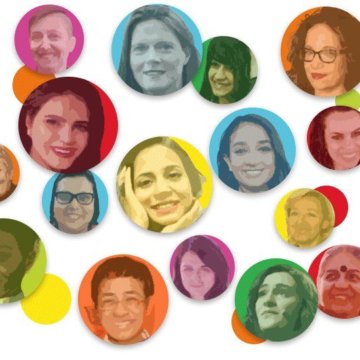- About
- Topics
- Picks
- Audio
- Story
- In-Depth
- Opinion
- News
- Donate
- Signup for our newsletterOur Editors' Best Picks.Send
Read, Debate: Engage.
| topic: | Women's rights |
|---|---|
| located: | Ecuador, Brazil, Colombia, Mexico, Venezuela |
| editor: | Magdalena Rojo |
Last week, the BBC published the list of 100 influential women for 2019. Their choice of women from Latin America gives us an insight into the prevalent issues the region is facing.
One of the best-known women on the BBC list is the Mexican actress Yalitza Aparicio who was the first indigenous woman to be nominated for the Academy Awards for her cast in Alfonso Cuaron's Oscar-winning movie Roma. In Aparicio's native state of Oaxaca in southern Mexico, there were a lot of debates about her being used by the industry, she also had to stand up for her own success in front of her own people. However, she ended up using the opportunity and became an advocate for constitutional protection for domestic workers, rights for indigenous communities and for gender equality.
The last topic is the one that connects the majority of Latin American women chosen by the BBC. Brazilian congresswoman Tabata Amaral has had women rights on her agenda as a parliamentary member. Argentinian doctor Mabel Bianco has introduced policies tackling women's reproductive health as well as HIV/AIDS and violence against women. She is also a pioneer of sex education in Argentina. Djamila Ribeiro is an Afro-Brazilian writer and one of the most influential figures in the Afro-Brazilian women's rights movement. She stresses the importance of facing colonialism as a way to dignity.
Ecuadorian María Fernanda Espinosa is only the fourth woman to be a president of the UN General Assembly and is, among other topics, promoting women's participation in decision-making alongside environmental protection.
Environmental justice is another common topic that Latin American women have been fighting for. Colombian Francia Márquez did not fear to stand up against illegal gold miners in the mountainous region of La Toma. She organised a women's march towards the capital and by protesting along with other women was able to make the Colombian government take on the decision to stop illegal mining. Death threats were no reason for Márquez to step back.
Luchita Hurtado is a 98-year-old Venezuelan painter who only recently exhibited her work publicly for the first time. She paints a woman, a womb, the Earth. Paola Villareal is a Mexican computer programmer developing data tools that can be used by advocates, activists, lawyers, and journalists to reduce inequality. Inequality is the third topic that connects this year's Latin American women on the BBC list.
All three fields are strongly interconnected, and some of these women are an example of that connectivity. Inequality - of genders or other groups in the society - can be both: a reason for environmental destruction as well as a solution.
Image: BBC
